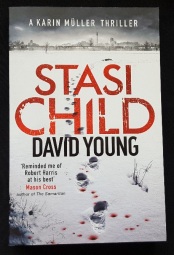I haven’t blogged for a while because I’ve been both deeply engaged with my day-job and also starting to write my next book, a currently un-titled post-BREXIT espionage thriller. Progress with the writing has been slower than I had wanted but I’m now about 30% of the way through and hope to make good progress in the next few days.
Since publishing ‘Dead Snow’ at the start of 2017, much of this year has been about preparation for writing the post-BREXIT thriller. Although I have read many thrillers over the past decades from very successful authors like Ian Fleming, Alistair MacLean, Henning Mankell and Jack Higgins, I felt it was important to become more systematically acquainted with the norms and expectations of this genre… which was a great excuse to indulge myself in reading some fantastic stories that I’d like to share with you now!
My reading began with the first three books by Maj Sjöwall and Per Wahlöö. 
The commentary within the books explains how they explore an increasingly hidden and brutal dark side of Swedish society. I still found the realism of the crime in ‘Roseanna’ a hard read even 49 years after its first publication in 1968. By the time I was reading about child-killings in ‘The Man on the Balcony’ I found their writing had reached a level of stark exposition that was plainly executed yet deeply disturbing. These masterful novels have stood the test of time and I would recommend them to everyone. By the end of book 3 I was feeling as worn down as the main protagonist, detective Martin Beck, and ready to try something different.
David Downing has written quite a series of books around his ‘John Russell’ and ‘Effi Koenen’ characters. The three novels I read span the period from April 1945 to 1948. 
Although I initially found it hard to care about either of these characters, Downing evokes such a great ‘sense of place’ in his writing that I was slowly sucked in. For me the three books showed how love can overcome extreme adversity, whether that be John’s love for Effi as he tries to reach her in Berlin from the Soviet lines in 1945, or her love for humanity as she shelters Jews during the final days of the Reich, or their joint efforts to look after their family and adopted daughter while the Russians keep John on a tight espionage leash in 1948. These books are both very engaging character studies and great examples of how to use ‘place’ to magnify plot.
I then come to a contrast between James Patterson’s “Kill Alex Cross” and Clive Cussler’s “Mirage”. To be honest, I was quite disappointed with Patterson’s story; it was told very quickly with little character development and ultimately I didn’t care if Alex Cross was killed or not. The creation of tension through the kidnapping of the US President’s children was lightweight and nowhere near as engaging as the direct, sustained action that Bryan Devore achieves in “The Paris Protection”. 
Despite his publishing success, Patterson could learn a lot from Devore, as “The Paris Protection” is a well-plotted and realistic piece of writing that remains exciting right up to its closing pages. The only criticism I would make is that “The Paris Protection” felt a bit protracted, and excising some of the plot steps could make it an even more exciting read.
Which brings me to Cussler’s “Mirage”, which feels like a good balance between those other two stories. “Mirage” is reasonably fast-paced, with (just about) believable characters, and a balanced use of technology vs direct action that trips along in a reasonable Bond-style. I enjoyed the book and would recommend it to Bond fans.
I ha ve a personal fascination with Cold War stories, both real-life and fictional, and the following two books from David Young and John le Carré are equal examples of the best that Cold War thrillers have to offer. I feel that Le Carré’s “The Spy Who Came In From The Cold” is his best story in that vein.
ve a personal fascination with Cold War stories, both real-life and fictional, and the following two books from David Young and John le Carré are equal examples of the best that Cold War thrillers have to offer. I feel that Le Carré’s “The Spy Who Came In From The Cold” is his best story in that vein.
The character of Alec Leamas is deeply drawn and his eventual fate is a masterfully noir ending. I listened to an audiobook version of this story before reading the novel and Leamas’ very flawed character stayed with me for a long time.
I found David Young’s “Stasi Child” to be an excellent Cold War tale told from an unusual East German perspective.

The main character, Karin Müller, is totally believable as she attempts to navigate tensions within The Party and solve the riddle of a teenage girl’s murder beside the Berlin Wall. Like Downing, Young has a great ability to evoke a convincing sense of ‘place’, but his characterisation is deeper and I found Karin Müller’s adventure very engaging.
Still in the thriller genre, I need to say that I was very disappointed with Frederick Forsyth’s “The Day of the Jackal”. Despite its fame and successful film version (1973 UK release starring Edward Fox), I found the novel to be an unengaging tedious slog and eventually gave up on it about a quarter of the way through – life is too short to waste on tedium, and that decision made way to instead pick up on…
“Devour” and “Thirst” by L A Larkin. More in the vein of adventure stories rather than plain thrillers, both books had me turning the pages rapidly to find out what would happen next. It helps that both are set in Antarctica, as I have a fascination with cold places (as shown in my novel ‘Dead SNOW’) and this setting really appealed to me.

Larkin has a skilled way of placing seemingly normal people into unusually dangerous situations and have them achieve exceptional things. Strong characters are combined with rapidly progressing plotlines that reminded me of Matt Reilly’s writing (you have read ‘Ice Station’ and ‘Area 7’, haven’t you?). Thoroughly recommended.
Notable runners-up in my reading list this year included Ward Larsen’s “Fly by Wire”, J B Tuner’s “Gone Bad” and David Baldacci’s “The Innocent”. I’m currently reading Joseph Kanon’s “Los Alamos”, which I am finding interesting but slow moving.
Outside of the thriller/adventure genre I enjoyed both reading Jeffrey Goff’s colonisation sci-fi adventure “Hope 239”, which was packed full of good ideas, and re-reading Dante’s “Divine Comedy”.
I’m looking forward to a 2018 of finishing writing the first in the series of post-BREXIT thrillers and reading even more wonderful stories!
I’m amazed, I have to admit. Rarely do I come across a blog that’s both educative and entertaining, and without a doubt, you’ve hit the nail on the head. The problem is something that too few men and women are speaking intelligently about. I am very happy I came across this in my search for something relating to this.
LikeLike